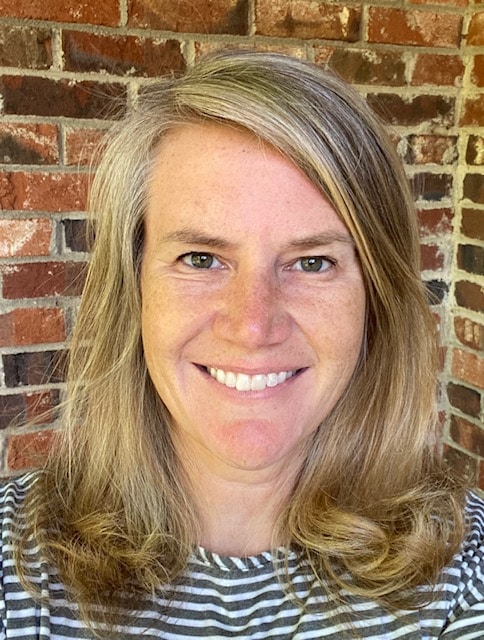
The roll call of 1980s girls’ names always left me wishing I had a “cute” name with an “ee” sound at the end: Katie, Cari, Jessi, Jamie, Jenny, Stephanie, Stacey, Bethany, Kelly. My classmates’ papers were full of cute little hearts over an “i” or a swirly “y” at the end. My name, Sarah, seemed so plain by comparison. It did not help that one of the popular books of the time was entitled, Sarah, Plain and Tall. At least I had Starship to bail me out with their popular 1985 hit song Sara, but even it was spelled with what I deemed the much cooler, “edgier” spelling. Then, as we were looking in a book of names to find one for my new little sister, I found out that Sarah meant “princess.” What little girl would not think that was a pretty cool meaning for their name? And thus, began my appreciation for my given name.

Sarah Blackwell
As I grew, I learned more about my biblical namesake and felt like I had common characteristics. Sometimes, like Sarah, I was able to set off confidently where God had called, and other times I liked to try to take things into my own hands, rather than waiting for God’s timing. Over the years, I learned to love my name for the stability and surety of it and the way I felt it suited me as a person. It is interesting the ways that one word can shape so many aspects of our lives. Whether it is traditional or unique, timeless or trendy, people often believe they know something about us (or our parents) through this one word. Even the spelling can have an impact on our lives and how others view us. How do you feel about your given name? Has the story of it shaped your life?
Once there was a guy in college who learned my name incorrectly. Every time I saw him on campus he called me “Susan.” The first time he did it, I was not sure I heard him correctly. The second time was in passing, and he was gone before I could say anything. From then on, it was just awkward. I was thankful for his attempt to know my name, but I also felt unseen at the same time. How often have we asked ourselves, does this person know me? Maybe we have seen them around the neighborhood or at church or kids’ sporting events, but there is an awkwardness in navigating whether we are remembered or whether we should reintroduce ourselves? Have you felt the inner struggle of trying to find someone’s name in your brain only to be left awkwardly avoiding having to say a name at all? Have you called out for a miracle when having to make an introduction of someone you know you should know?
Knowing someone by name is an important point of relationship and building community. I learned this early on during my time as a school teacher. Every year I would start with my students in assigned alphabetical seating (sorry to the Zweier’s in the back) with my own first night’s homework being to learn as many names as possible by day two. By the end of the week, I needed to know all of them. Why? Nothing is more disheartening to a child than not being known. Plus, it is really hard to discipline a student if you have to say, “Hey you! Stop doing that!” Using their name signals that they are worthy of notice – a gift that adults can give young people. While I strived diligently to complete this task every year, I remained an utter failure at remembering any adult’s name – especially casual acquaintances. I sadly knew some adults in my neighborhood by the name of their dogs or kids (that’s Max’s mom!). It seemed that some names would enter and exit my brain as quickly as the air I was breathing. I needed my two-year-old son, Thomas, to help me see the difference simply knowing and using someone’s name could make.
I first noticed it at the grocery store. Toddlers and grocery stores have a long history of epic meltdowns, but I had a friendly little guy that loved going. The reason he loved it was not the endless cases of yummy food choices or even the time that the two of us got to hang out together without his big brother. He went for the people. The random people we would encounter, yes, but mostly for the people that worked at the store. There was Savannah in the deli who would cut him off a piece of meat or cheese when he asked for “try-tries.” Sometimes Diana in the bakery would save him a cupcake that had turned over in its packaging and could not be sold (but was still delicious to eat). Mr. Mac in produce liked to talk about Braves baseball and his son who lived in Atlanta.
Most of all, though, Thomas loved to see Ms. Beth check out the groceries. We had to find Ms. Beth’s line or the trip was not complete. Before going with Thomas, had I ever even noticed the names of these people that I encountered week after week? No – it took the prodding of a young child’s question, “Who’s that?” for me to recognize them by their name (thank goodness for name tags) and not just as a familiar face. This shift for me was profound. Greeting someone by their name gives a sense of belonging and worth. It says, “It matters to me who you are.” I no longer dreaded going to the grocery store. It became something of a social outing with my companion at my side prodding me to meet people, to acknowledge them beyond the job they were currently filling, to slow down, and to be genuinely curious about others. The rewards were plentiful for such a minimal amount of effort on my part.

Jon Tyson / Unsplash
Several weeks ago, I was introduced to three new visitors at church. We remarked that we hoped that the names stuck in our brains and laughed about how often we quickly lost the names of new people we just met. We all acknowledged this as a problem, but it seemed to be accepted as just the way it is. Why do we lose so quickly this identifying mark of people we meet when it is such a large part of their identity? I love how our pastor tells new people that he meets to continue to introduce themselves to him until he greets them first by name (and to correct him if he is wrong). I appreciate this approach. It confirms that names are important, that he is trying to know them, but that he, too, is human and may slip up from time to time. He wants to make sure young and old have a sense of belonging and worth in our congregation. How could you improve your knowledge of and use of the names of those you encounter? How can you incorporate this as a spiritual practice?
Beyond just being good manners or respectful to others, we see in the Bible that naming was a sacred act. One of the first things Adam did in Genesis 2 was to name all of the creatures. God sometimes used a name change to mark a significant point of transition like with Abraham, Sarah, or Paul. We have accounts of angels telling both Joseph and Mary that they better use the name Jesus for their new baby. Zechariah could not even speak until he proclaimed “John” as the given name for his son. Names throughout the Bible had significance and deep meaning. They sometimes were aspirational, such as Jesus telling Simon that he would now be known as “Peter,” the rock. A most ironic name given how soon he would waver! Did Peter struggle with his name after his denial of Christ? Was he filled with shame that he did not live up to this moniker? Did it give him hope that Jesus saw something in him that Peter had yet to see? Sometimes a name can be a spiritual calling to aspire to.
When we are given the privilege of naming, we need to view it for the sacred act that it is – names matter. It matters both what we are named and how we use names. One of my friends from college named her daughter after Saint Lucia. With intention, they study the life of the saint and her role in Christian history. Her daughter carries on that legacy because of the intentionality of her parents. My own children bear the names of two of the disciples, Andrew and Thomas. We have been able to talk about the legacies of these namesakes with them. Andrew brought his brother Simon, the future rock on which the church was built, to Christ. Beyond the famous story of Thomas and his doubt, Thomas was also fiercely loyal to Christ being the first to suggest they may die with Christ. It is a story that brings up discussions about the role of faith and doubt in a way that my son is connected to. The names we give can provide our children a place in family history, a role model to follow, or even a unique place in the world with a non-traditional name. All are valuable if done with intention, explanation, and reflection.
Thus, if anyone is looking for a different type of meaningful resolution for the new year, I would suggest making names a priority. It is a simple assignment that can yield much fruit. Calling people by name can bond us to each other, create community, acknowledge the worth of each person, and share part of our story. It is a spiritual practice to take the time to make sure others are seen and known. So, who’s name can you learn this year? How can you use names in a more powerful way? Will you set a goal to answer the question, “Who’s that?”
Sarah Blackwell is a contributing writer at Word&Way and a 2020 graduate of the Gardner-Webb School of Divinity. She is a former deacon and volunteers with youth and young adults at Providence Baptist Church in Charlotte, North Carolina. Other names she has been known by include Sweet Pea, Sissy, Sarasoda, Coach B, and Mom. She still remembers the names of those three visitors. Follow her writings at proximitytolove.org.






